Cultura vS Censura
Imagine this: it’s the day before the National elections. The air is electric with anticipation, and polling shows it to be an extremely close race. No matter who wins, protests are likely and you worry about the potential for violence. Things feel so divided these days, and people are so angry. You reach for your cell phone, to remind your mother to remember to vote and to be sure to stay safe. However, Whatsapp has stopped working and your messages aren’t going through. You think it’s perhaps a network problem, so you check another messaging service. It’s not working either. You can’t access the main news sites you use and you think… could they really be cutting off access to the internet???! How can I do my job? How can I get the news and important information? How do I talk to my mother?
This is the reality for millions of people who live in countries where the Government has shut down the internet as a mechanism for control. In 2022 alone, Access Now recorded 187 internet shutdowns in 35 countries. These shutdowns take many forms- they can target an entire country, specific regions or municipalities. They can take out entire networks or they can block certain popular social media platforms and communication services. Governments can even deliberately slow the speeds of the internet so that it just looks like you have a bad connection.
Governments shut down the internet during elections, protests, unrest and conflict. Sometimes they even shut off the internet in an entire region to prevent cheating on exams. They often claim shutdowns are used to stop the spread of hate speech, curtail violence, or prevent disinformation- however, there is no proof that shutdowns are effective to control these problems. In fact, lack of information often exacerbates violence, uncertainty and rumor. These shutdowns often happen during moments when the Government seeks to avoid international scrutiny about human rights violations and problems with election integrity. In India alone, last year there were 84 times the government shutdown the internet. In Ethiopia, the people who live in the Tigray region have endured an entire communications blackout for more than two years, unable to communicate at all with anyone outside.
Enter ‘CULTURE VS. CENSORSHIP —here we seek to bring you more than facts and figures about internet censorship. We want you to think about what it might feel like, in a political moment of chaos or uncertainty, to be cut off from the internet. We’re so accustomed to constant connections with our devices and our networks, it might be hard to imagine what you would do in this scenario: what would an internet shutdown mean for your community and your country? What kinds of feelings of fear, uncertainty and anger you might feel? We also want to showcase the art and collaborations between creatives and activists that demonstrates the courage and determination of individuals and communities who refuse to be silenced and continue to fight back to #keepiton.
This show features works from four very different countries- India, Tanzania, Bangladesh, and Senegal- that have experienced very different kinds of internet shutdowns. India has been the country with the highest number of internet shutdowns for five years, with censorship concentrated in certain regions and few shutdowns in other parts of the country- widening existing divides. Tanzania experienced its first internet shutdown around the Presidential elections in 2020, and now people wonder if the new President will use shutdowns as well during the next elections. Bangladesh has experienced at least 17 shutdowns since 2012, and access has been deprived in refugee camps, during protests, and moments of instability or violence. Senegal, considered one of the most stable democracies in Africa, has seen recent worrying signs of creeping authoritarianism and experienced its first short internet shutdown in 2021 around protests against the arrest of a main opposition leader.
Internews’ OPTIMA project has worked with civil society organizations in each of these countries to better understand what activists and journalists need to prepare for, prevent, and resist shutdowns. As part of this project, we wanted to understand the communication challenges when it comes to pushing back against shutdowns and to better understand how we could build public awareness and engage new communities through creative formats to talk about internet shutdowns. This show features some of these works- including paintings, illustrations, comics, music videos, street performances, and guerilla art-activism campaigns. We encourage you to explore these works and ask questions.
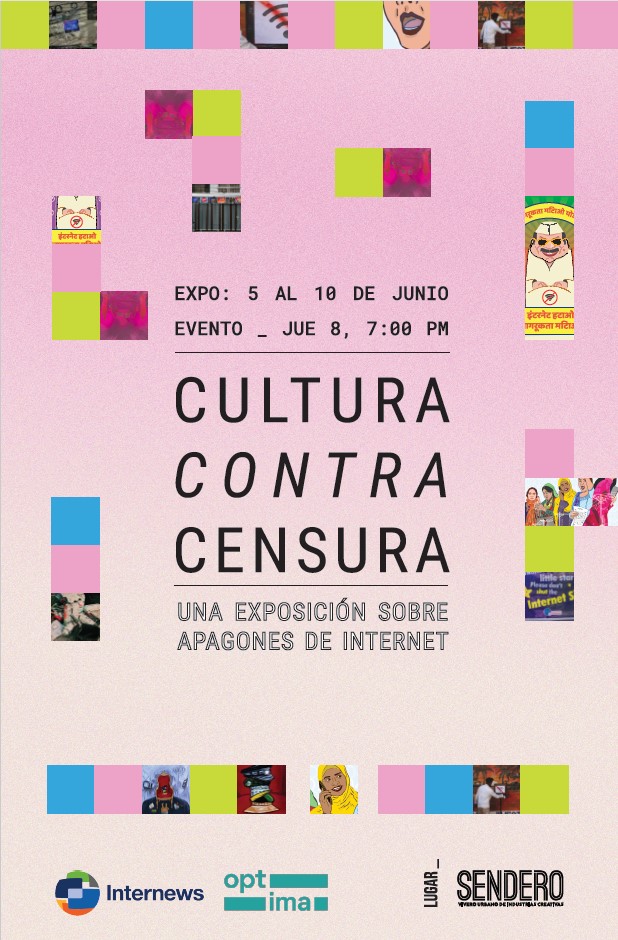
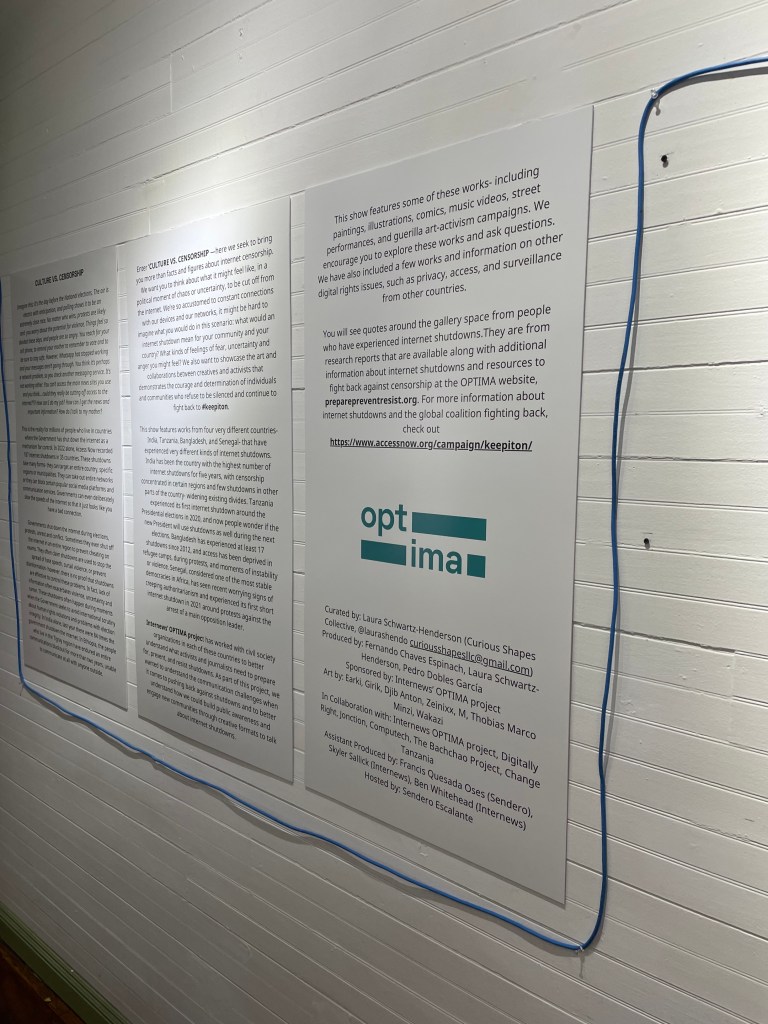
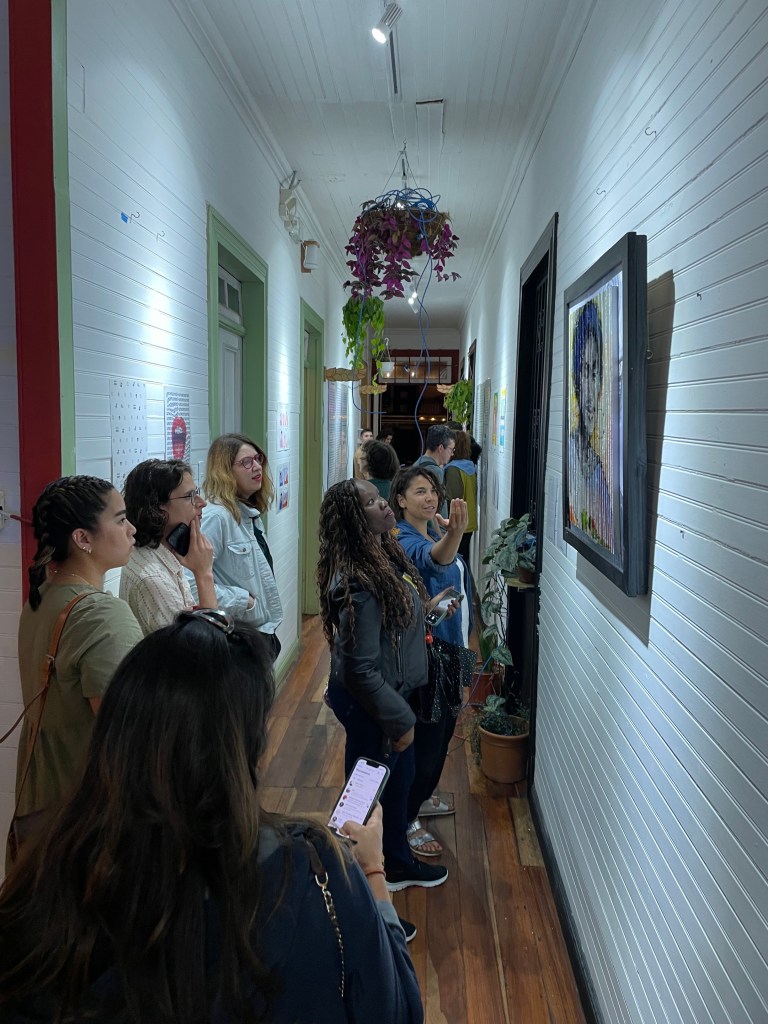
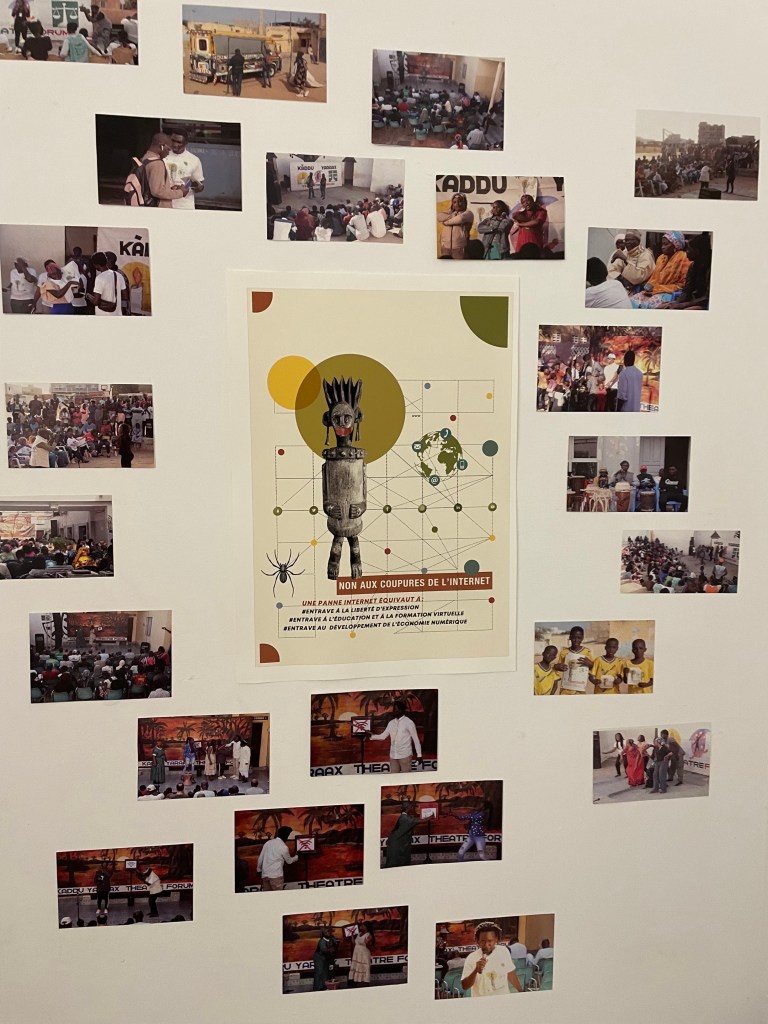
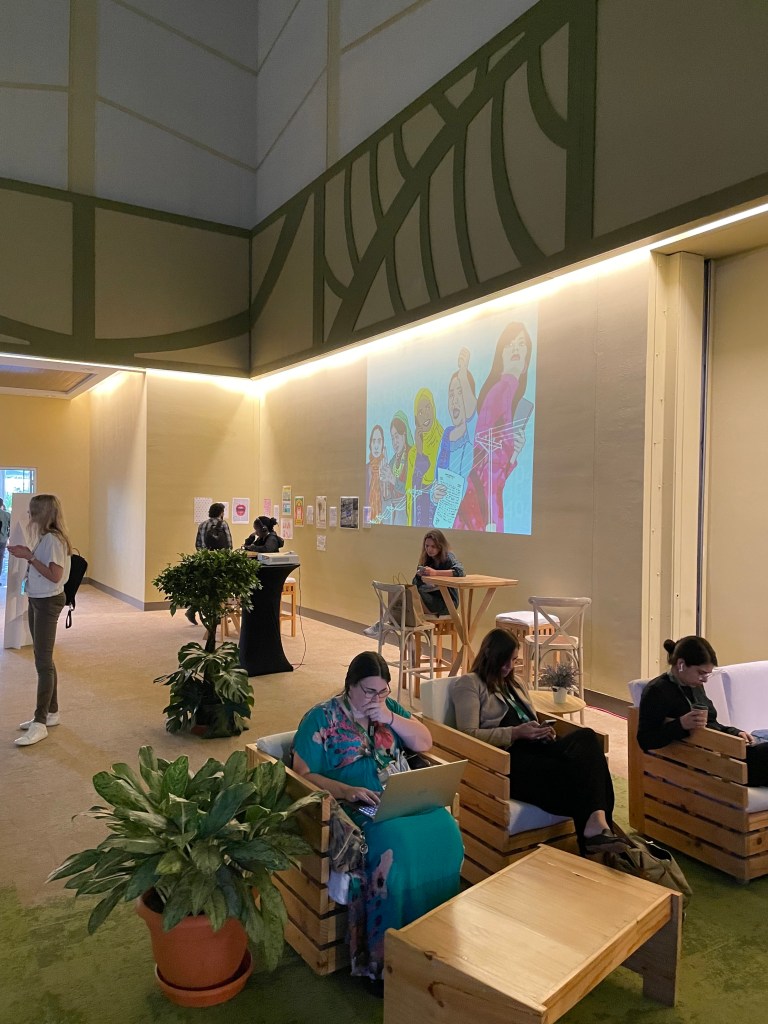
Credits
Curated by: Laura Schwartz-Henderson (Curious Shapes Collective, @laurashendo [email protected])
Sponsored by: Internews’ OPTIMA project
Art by: Earki, Girik, Djib Anton, Zeinixx, M, Thobias Marco Minzi, Wakazi
In Collaboration with: Internews OPTIMA project, Digitally Right, Jonction, Computech, The Bachchao Project, Change Tanzania
In person production in Costa Rica: Produced by: Laura Schwartz-Henderson, Fernando Chaves Espinach, Pedro Dobles García
Assistant Produced by: Francis Quesada Oses (Sendero), Skyler Sallick (Internews), Ben Whitehead (Internews)
The song is basically about the issue that took place in 2020 where the Internet in Tanzania was shut down during the election and carried over to 2021.
At the time I released a song with a similar title “Mzalendo: Barua ya Wazi”, which means “Patriot: An Open Letter”, a song addressed to the then-President Magufuli. That song was censored. I also participated actively in the election by running for office (Member of Parliament Seat) in the Ukonga constituency in 2020. Censorship and internet shutdowns prevented me from campaigning and getting my message out.
The shutdown impacted me personally- hence, I feel it is not just my obligation to remind people about the impact, but it is also deeply personal. This is my “Barua ya Wazi” part 2, my second open letter, and Mtandao means the Web (internet). This is a new letter addressed to the new President, Samia Suluhu Hassan, the former Vice President of Magufuli, who took power when Magufuli died in 2021.
The lyrics of the song are more powerful than anything, and we wanted to use music that matches the energy and mood. We added the live element with a Saxophone, and featured a vocalist (Frankie Maston) who was also anonymously featured on the first “Barua Ya Wazi” song. We refrained from having the vocalist (Frankie Maston) appear in the video to avoid unnecessary attention; Frankie identifies as LGBTQ, and recently in Tanzania there has been a crackdown against such individuals so it is for his safety and unwanted distractions so we can get this message out there.
As an artist, I wanted to look back at the situation in hindsight and remind the people and the government that such things should not repeat again. Art and culture mirrors society. I wanted to use this song to remind us who we are and who we are not.
BRIDGE: (Frankie Maston)
When will we raise our voices, for us to be heard
I’m not left with many choices, my heart is still void
I don’t care, I don’t care if y’all annoyed
This truth you can’t avoid
HOOK: (Frankie Maston)
This is an open letter, to all, so we can stand up as a nation
An open letter, to all, The government and especially the President
An open letter, to all, so we can stand up as a nation
An open letter, to all, The government and especially the President
VERSE 1: (Wakazi)
We are far from where we were, it was so lethal
Now you can see, the peoples’ faces are so cheerful
All that we been through, certainly it wasn’t simple
So It’s needful, for someone to speak up for his kinfolks
But how will the voice be heard for certain?
If the Internet is not well connected
Mental whirlwind, chaos and contention
You can’t find these debacles in abroad, for certain
I’m giving you free jewels, they not for sale
Just the other day we tweeted, but the messages failed to deliver
Just for the sake of the Elections, y’all losing y’all minds can you believe that?
How can one be so selfish, and claim to be a Leader
Maybe we need, new visionaries for them to lead us
I’m from Tanzania, the country that
Doesn’t just ban politically themed songs on media, they ban even the media
Come to me for a dose of flows, concurrently with one of those
Type of songs for the “Mother and her Sons” of course
I just have to mention, maybe this was a divine intervention
Hope we could learn through these lessons
That’s so valuable, I tell it like it is, without aggression
To the dearly departed, bless their hearts, wherever they are, hope they stay peacefully resting
BRIDGE: (Frankie Maston)
When will we raise our voices, for us to be heard
I’m not left with many choices, my heart is still void
I don’t care, I don’t care if y’all annoyed
This truth you can’t avoid
VERSE 2: (Wakazi)
Madam President, Samia
I know we are not that close for me to start with, “Dear”
But I’m your son too
So I’m gonna skip the protocols
Cause now you’re the Mother of every Tanzanian
So I must tell you all the things that we went through
Take it back to 2020, my vision is clear
What happened for y’all to shutdown the internet
It’s imperative that we keep reminding ourselves these things
Mama, we trust you and we’ve seen you taking some actions
But it is a must to do assessments, we we truly love this nation
Checks and Balances, call a spade a spade
But for God’s sake, I hope I wont be harassed, or followed by Secret Service Agents everywhere I go
Free Media, Freedom of Expression
Will make our leaders accountable, and fulfill their obligations
From 4G, to 5G and Fiber Optics
Tanzania shutdown everything, what kinda optics were we hoping
To project to the international community?
Selfish, and self serving, just for a chosen few to benefit
From those CyberCrime Acts, that were placed strategically
And now affecting Journalism and Freedoms of Expressions, it is so clear
HOOK: (Frankie Maston)
This is an open letter, to all, so we can stand up as a nation
An open letter, to all, The government and especially the President
An open letter, to all, so we can stand up as a nation
An open letter, to all, The government and especially the President
BRIDGE: (Mukiza Saxophone/Wakazi Adlibs)
Y’all shutting down the internet, why is that?
Y’all shutting down the internet, why is that?
Y’all shutting down the internet, why is that?
Y’all shutting down the internet, why is that?
VERSE 3: (Wakazi)
Listen, internet affects the economy
Healthcare provision, Education, even socially, its no rumor
Journalists are now freed, but the Laws that had them remanded are still Active
They even put a bullshit case on Hon Freeman Mbowe from Hai
Political oppression, democracy regression
Media houses are put on leash, there’s no Freedom of Expression
We got alit to say Madam, lets put our words to actions
I’m speaking on behalf of the Tanzanian youth, through the speakers that I’m blasting
HOOK: (Frankie Maston)
This is an open letter, to all, so we can stand up as a nation
An open letter, to all, The government and especially the President
An open letter, to all, so we can stand up as a nation
An open letter, to all, The government and especially the President
An open letter, to all, so we can stand up as a nation
An open letter, to all, The government and especially the President
An open letter, to all, so we can stand up as a nation
An open letter, to all, The government and especially the President
Credits
Song: “Mtandao (Barua Ya Wazi Part. 2)”
Artist: Wakazi ft. Mukiza & Frankie Maston
Composed by: Webiro “Wakazi” Wassira, Aboubakar Dachi, Mukiza Mwiruki
Produced by: Black Beats
Written by: Webiro “Wakazi” Wassira
Recorded by: Ommy Daddy at Manifester Studios
Arranged by: Wakazi & Ommy Daddy
Mixed by: Ommy Daddy & Black Beats at Manifester Studios
Additional Mixing by: Mujwahuki at Manifester Studios
Mastered by: Mujwahuki at Manifester Studios
Additional Work done at 41 Records & Haddy Pro Studios
by Earki
At a time when internet platforms wield significant influence as public forums, shutting down the internet through illegal or emergency orders has gained popularity among authoritarians. A report by KeepItCoalition ranks Bangladesh fifth globally for internet shutdown. In 2022 alone, access to mobile data was either completely cut off or throttled at least 6 times.
The government (proudly) estimates nearly 130 million people use the internet in Bangladesh. Political leaders boast the story of digital transformation, yet condone ‘emergency’ internet shutdowns.To put this into perspective, each time the country enforces an emergency order, 130 million are effectively cut off from communicating with the rest of the world. This egregious violation of Article 19 of the Universal Declaration of Human Rights is an alarming infringement on political discourse, access to information and everyday livelihoods.
Despite disruptions becoming more frequent, there are few efforts to systematically document it. In a culture of harsh laws and self-censorship, there are fewer efforts to protest against it. Condemning government orders comes with severe consequences, including facing up to 14 years in prison.
Cabledown is an attempt to amplify our collective voice against internet shutdown. Sprawled across major cities in Bangladesh, jumbled-up overground cables connecting homes to broadband internet represent a remarkable integration of these urban centers with the rest of the world. We hang these very wires with our messages of protest, each representing a satirical take or pun of popular proverbs, movie themes, advertisements, songs or folklore. They start a conversation because the characters and words are relatable. As people stop and look, they whisper to each other and soon enough… there is murmur on the streets about how taking away the internet is a violation of people’s rights.
During the course of this project, we were interrupted several times by the police who would not allow us to hang the posters. Simultaneously, we met ordinary people who told us their stories of struggle when the internet was shut down. Someone could not speak to a sick relative, a woman lost income from her online business and students who were thrown into an information void and had no idea what was happening during critical times. We had to carry on with the project after midnight. This is the reason most of the photographs are taken at night. This stark contrast between two realities is the essence of our endeavor—a city stumbling in its own progress when the cables go down.
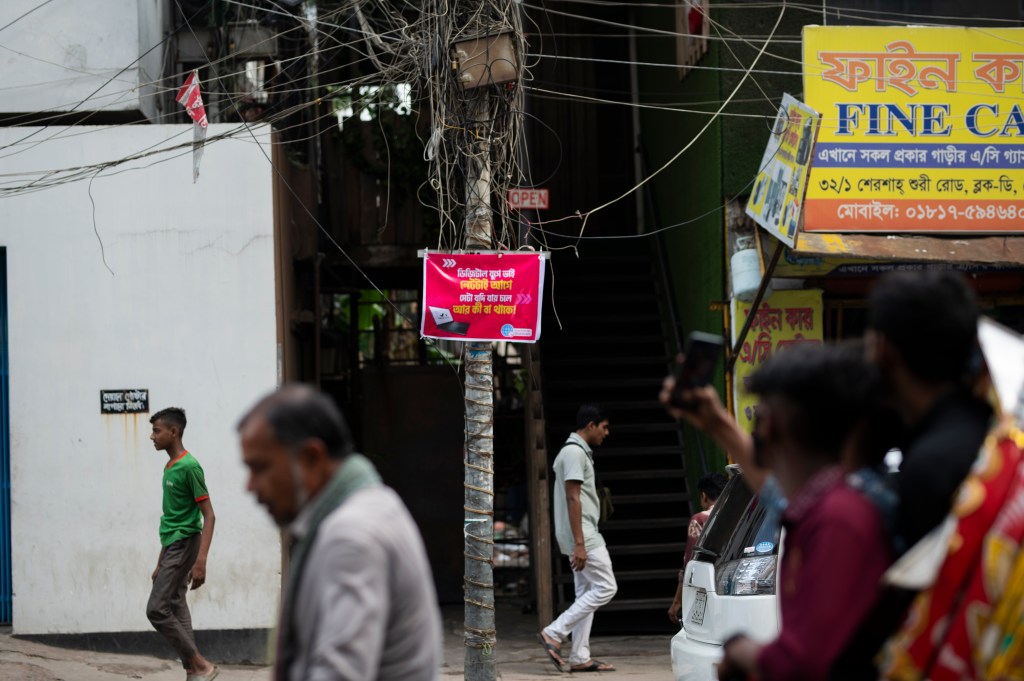
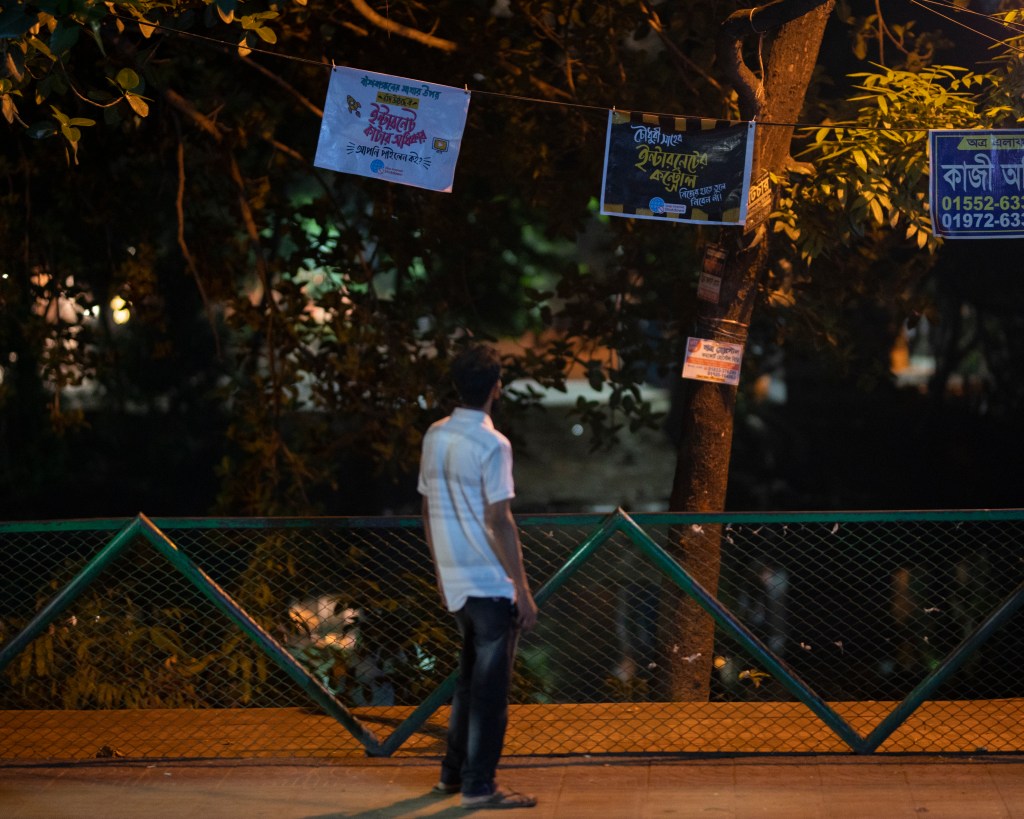
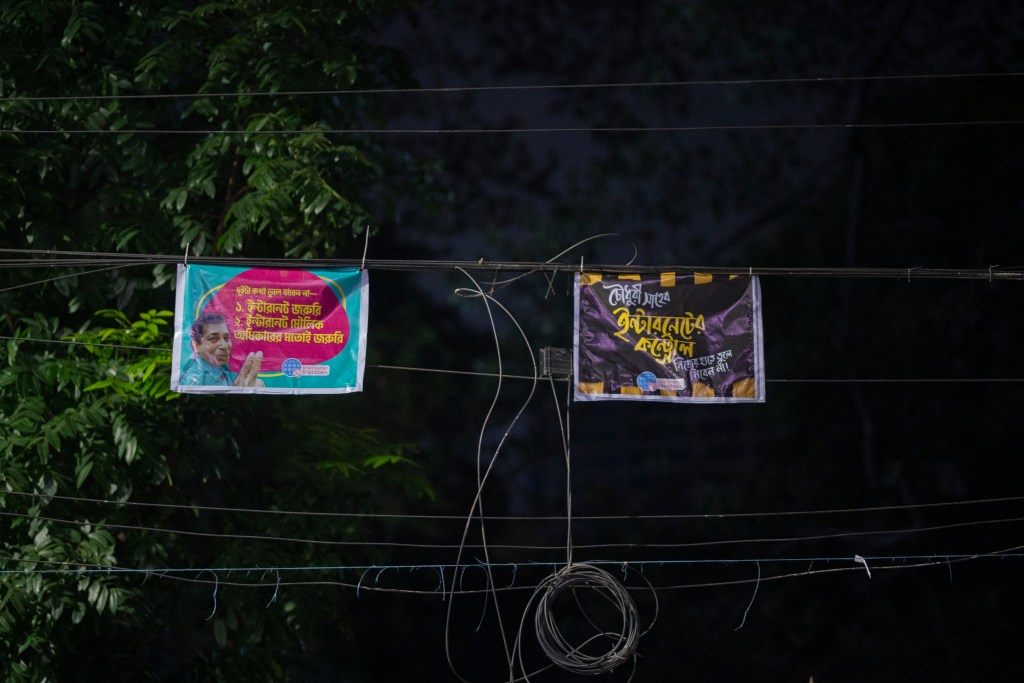
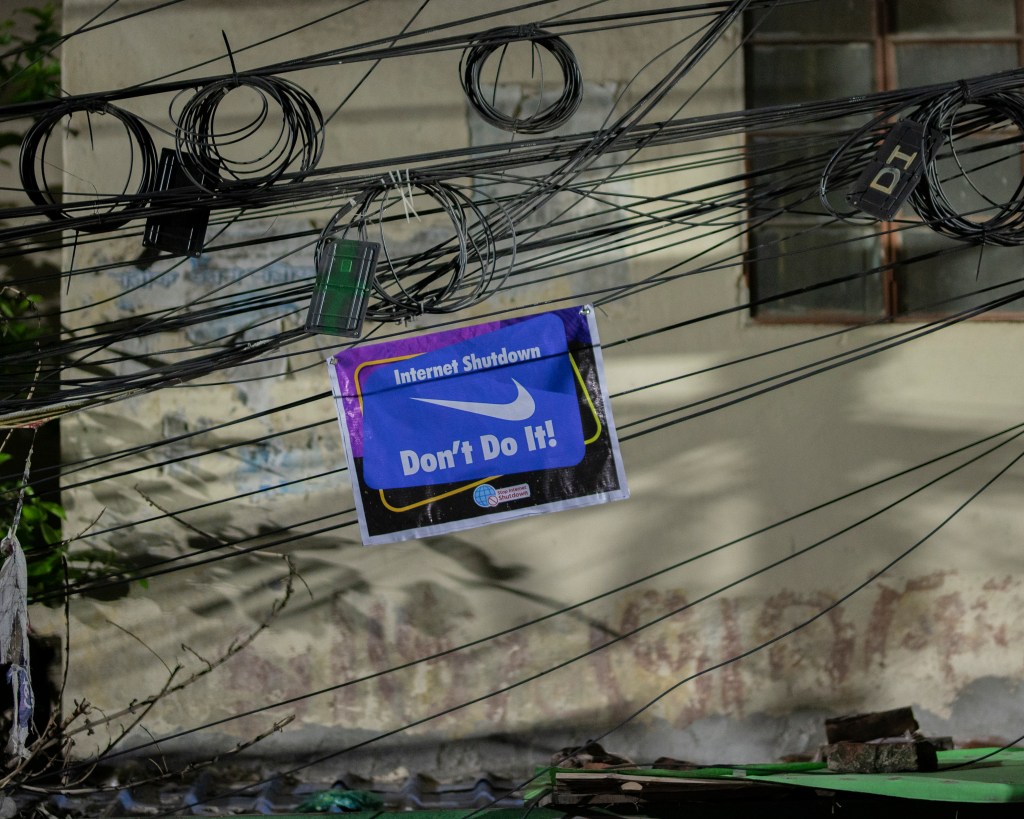
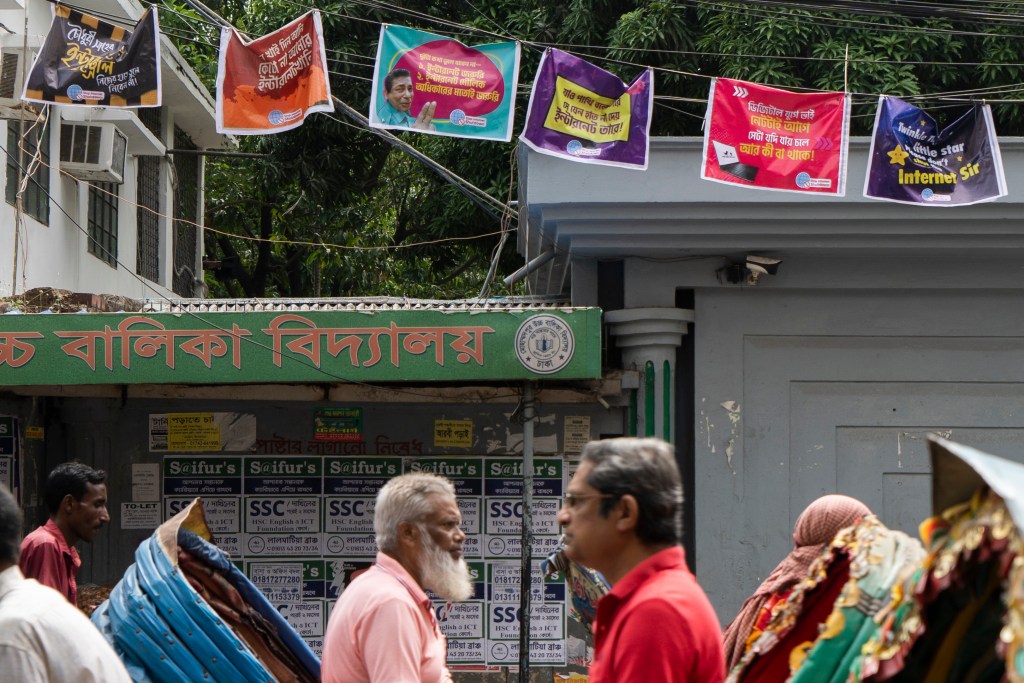
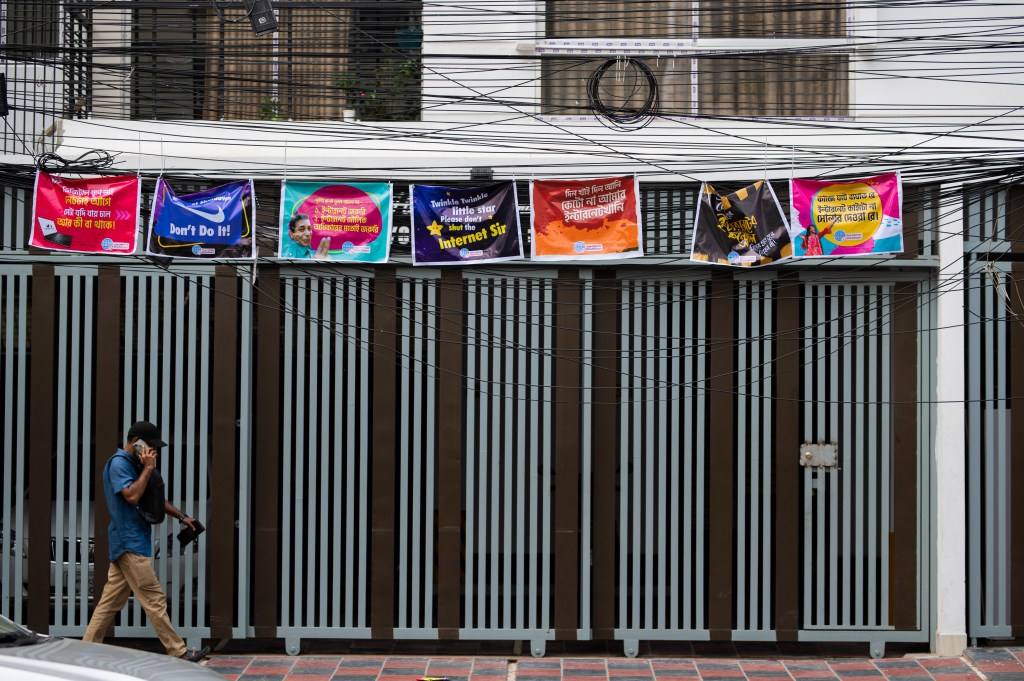
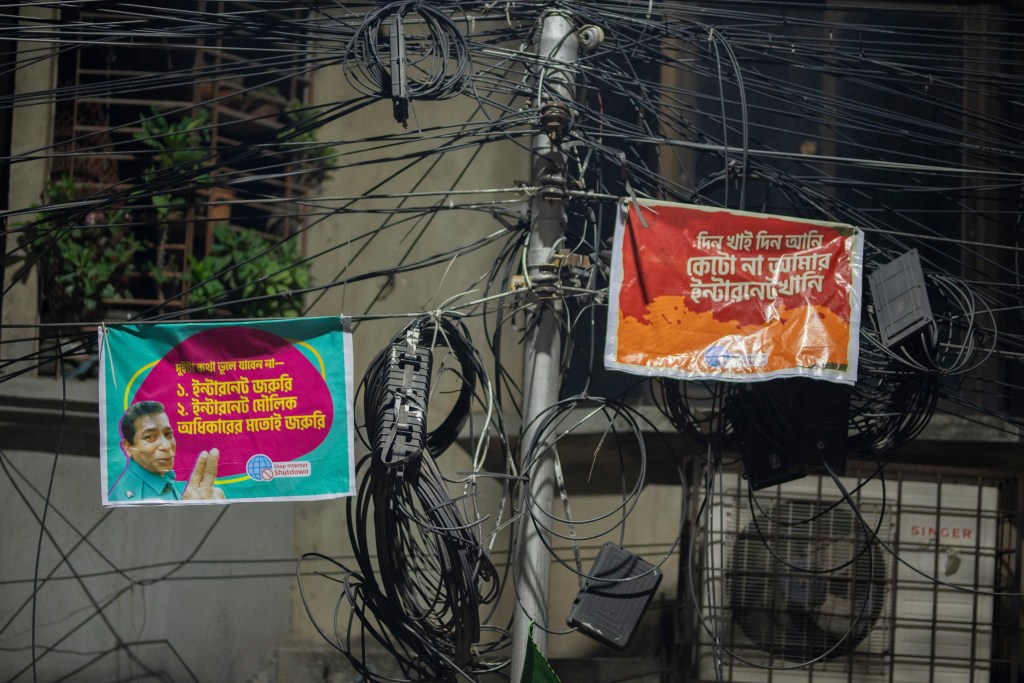
Poster Translations
POSTER #1: “In the digital age, internet is a first. If there is no internet, is there even a next?”
POSTER #2: “Don’t do it” (a satirical take on Nike’s advertising payoff line, illustrated through a reverse logo)
POSTER #3: “It is important to remember two things in life: one, internet is essential, and two, internet is as essential as your fundamental right” (a satirical take on a popular character from a web series in Bangladesh where the main character gives life lessons in two parts)
POSTER #4: “Twinkle twinkle little star, please don’t shut the internet, sir” (a satirical take on a popular children’s rhyme)
POSTER #5: “I make ends meet online, don’t take my internet away” (a satirical take on a popular Bangladeshi proverb describing the economic woes of the growing middle-class)
POSTER #6: “Mr. Chowdhury, do not take the control of internet in your hands” (a satirical take on a popular Bangladeshi movie character, known locally as Chowdhury Shaheb)
POSTER #7: “Stop, my lovely brother-in-law. Shutting the internet interrupts my day” (a satirical take on a recent musical production from Coke Studio Bangla. Brother-in-law, locally known as deora, is widely used among folklore artists to refer to someone they revere)
POSTER #8: “On such a night of the full moon over the bamboo trees, why have you taken my internet away” (a satirical take on a children’s poem by Bangladeshi poet, Jatindramohon Bagchi, on your loved ones gone missing)
POSTER #9: “Tell the bird to be careful about snapping the internet cable” (a satirical take on a Bangla folk song that illustrates a conversation between people through birds as messengers)
About Earki: Earki is a political satire platform based in Dhaka, Bangladesh, that leverages pop culture, digital storytelling, arts, literature and creative productions to raise awareness and build coalitions to safeguard and promote human rights. The platform is a network of 115 writers, artists and creators with original content that engages over 3.1 million people online every week. Learn more at www.earki.co and on instagram at @earkidotcom
Artists:
Kasafaddauza Noman
Syed Khaled Saifullah
Simu Naser
Fowzia Afroze
Rubel Rony
Nazmul Hossen
Photographs:
Mohammad Jubair
Saiful Islam Nabil
Campaign: Jonction & Computech
Performances: Kaddu Yarakh Théâtre Forum
Poster: Djib Anton
Mural: Zeinixx
Music: TAFF PROD
As part of the Senegal Prepare & Prevent Network, Jonction and Computech worked with a coalition of journalists and activists to design an informational campaign throughout Dakar, Senegal’s capital city. In doing so, they partnered with the theatre group, Kaddu Yarakh, to create engaging and participatory street theatre performances- and with artists Djib and Xeinixx to design posters and an accompanying mural.
The roadshow took place for one month in February and March of 2023, traveling to ten separate neighborhoods in wider Dakar. As described by Daoude Diagne from Computech, “This was a great opportunity to raise awareness on Internet Shutdowns issues in Senegal and share the findings of the research conducted. Young men and girls, generally students, spread out on the streets of every location. Wearing Optima designed t-shirts with a key message, they talked to the population everywhere they met individuals and communities, raising awareness. It was good to have the performance group because we changed the paradigm by creating a craze around the roadshow. With the theater group, the population felt involved in the activity. It was a kind of raising awareness through having fun. People got more interested and focused on what we were doing.” People are less aware about censorship and shutdowns in Senegal, and with an upcoming election the performances raised awareness about what could happen if there was an internet shutdown during the election and how this would impact businesses and everyday life.
In addition to the roadshow, Jonction and Computech worked with TAFF PROD, a hip hop collective of ten young rappers that worked together to produce two freestyle rap videos that are being used and shared with radio stations.
JONCTION is a non-governmental organization, based in Dakar in Senegal, which aims to promote and defend human rights. Founded in 2006, Jonction has conducted a number of advocacy and awareness campaigns on the protection of personal data, privacy and freedom of expression in both Senegal and West Africa. It has a particular focus on the right to privacy and freedom of expression on the Internet.
COMPUTECH INSTITUTE is a vocational training and research institute. Based in Senegal where we deliver ICT training sessions to the population from middle class to low income persons. We also target vulnerable people to give them a chance to acquire ICT skills.
Computech Institute is active in the digital rights sector, doing research and advocacy. We worked with organizations like Jonction (several workshops), Paradigm Initiative (Training and research), the Senegal’s Government on the National Cybersecurity Strategy, among many others.
Kaddu Yarakh Théâtre Forum is a theatre group based in Dakar. Follow Kaddu Yarakh on instagram at @kadduyaraax_theatre
Djib Anton is a graphic artist based in Dakar.
Dieynaba Sidibé, popularly known as Zeinixx, is a Senegalese slam poet, graffiti artist and activist. In 2009, at the age of 24, she is known to have become Senegal’s first female graffiti artist. Sidibé uses her graffiti to campaign for women’s rights and to speak out on social and environmental issues.The theme of women is recurrent in her works, which also reflects on the place of women in sub-Saharan African society. Follow her on instagram at @zeinixx
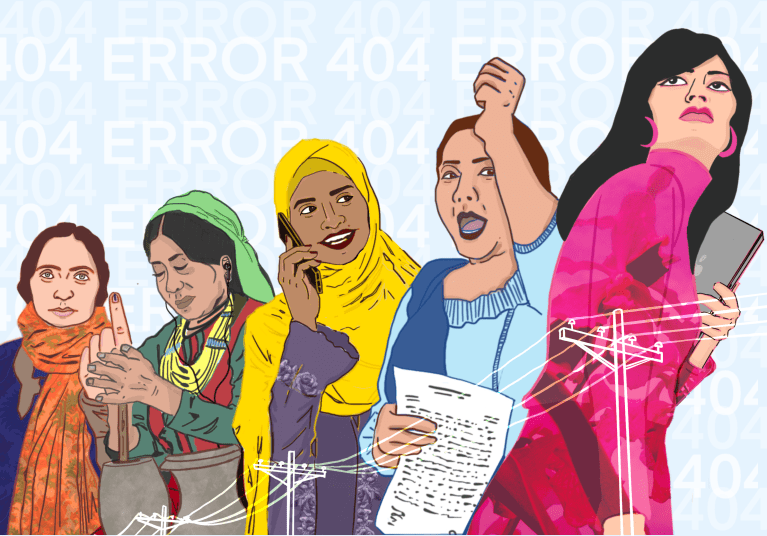
By: M & The Bachchao Project
India is at the top when it comes to implementing internet shutdowns. The number of shutdowns implemented so far in 2023 is 34. India implements internet shutdowns for various reasons. We at The Bachchao Project have been observing the internet shutdowns and their effect on women and LGBTQIA people for seven years now and we see that internet shutdowns affect these populations in the following way:
- To assert their identity
- The right to protest
- The right to be safe
- The right to Livelihood
- The right of Self Determination
This is a traveling mural meant to be projected in large scale in many contexts to remind viewers of the impact that shutdowns have on the women of India.
Artist : M
Concept : M and The Bachchao Project
Licensed under CC-BY-SA 4.0. For any waivers please write to [email protected]
By: Thobias Marco Minzi
Internet access has become one of the basic human needs for many people. Through it people access information and service and conduct their business among other things. In October 2020 during the presidential election Tanzania faced an internet blackout where they could not access social media and messaging apps such as Twitter, WhatsApp, instagram. This social media censorship was noticed a day before the election and after the announcement that the winner was the incumbent president, Magufuli. The opposition parties leaders were vocal about what that could mean and accused the government of vote rigging and threatened to conduct rallies. It was also during this time that I had prepared my exhibition of paintings- but my exhibition was stalled because I couldn’t access my social media and publicize the exhibition. It was a time of uncertainty and fear, since any types of gatherings (even art exhibitions) were highly scrutinized to ensure that there were no opposition rallies. Through my painting titled LIFE IN A BLACKOUT, I wanted to reflect on this time. I cannot show or sell such a painting here in Tanzania for fear of issue, so I am happy to have it displayed internationally.
This 3D painting seeks to tell a story of the life before, during and after the 2020 internet blackout in Tanzania. The poster is meant to be seen from the eyes of a businesswoman who represents the working class and who depends on internet connections to conduct and boost her business.
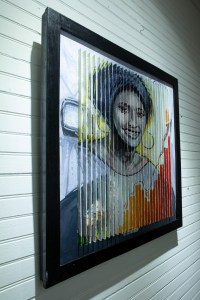
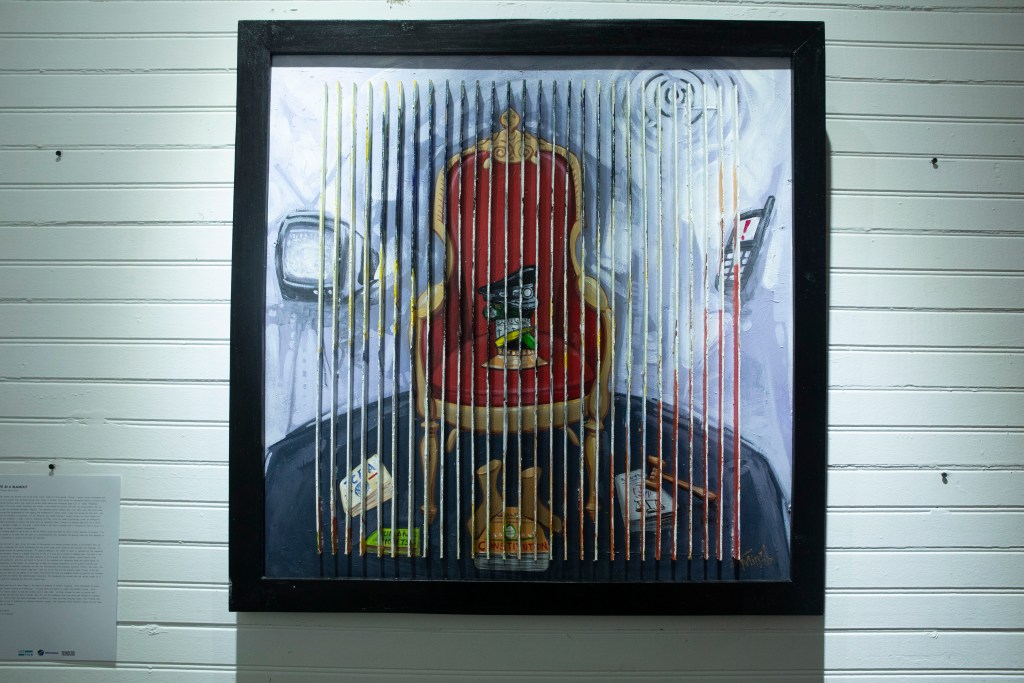
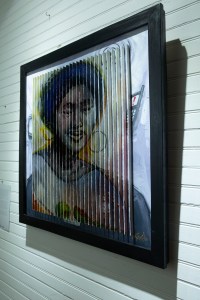
In person, this painting changes depending on the angle that you view it. You move from left to right. In the first vision of the painting is a smiling business woman, at the bottom there are fruits which symbolizes the fruitful businesses that she grows using online platforms and services, like whatsapp. The upward graph shows her growing revenues.
The second painting in the middle is meant to represent all that happened around the elections. There is a golden chair and on top of it there are a number of different hats. The chair is the absolute authority of the president. The hats represent all of the power of official violence (police officers, army soldiers and generals), and they are bound to the will of the president and repressing those who would speak up against censorship. At the bottom, the golden feet sit atop the National constitution, as this authority controls and tramples not only the National constitution but also the communication and regulation authority (TCRA) and Court. The people are represented by the bottom straw hat – they are at the mercy of the authority figure.
Finally, in the last painting you can see that the woman is no longer smiling and the fruits are scattered across the ground. Her business is suffering from the internet and communication censorship. She represents the citizens who are usually caught up in the middle and are implicated the most with internet bans.
Thobias Marco Minzi
@Minzis_art on instagram
Thobias Minizi was born in Iseni Village in the district of Mwanza in northern Tanzania. Minzi developed his artistic skills through informal training and workshops. He uses fabric and paints to create semi-abstract pieces. Minzi creates art to inspire people to love one another and to work hard. He often focuses his work on women and children and the role that they play in African daily life, and the challenges they face living and working in a developing country. Minzi’s work has been showcased in exhibitions in many countries, including Spain, USA, Finland, and Denmark, and is part of collections at Muhimbili National Hospital, The Tanzanian Prime Minister’s office, and the State House in Dar Es Salaam.
By: Girik
While Internet shutdowns have become a very normal thing in India, it largely does not impact many people living in the major cities- like me. Because it was not happening to us, it did not bother me as well… until it happened to me during a protest in New Delhi. Then I started to speaking to people in certain parts of the country who regularly experience shutdowns and they shared problems they had faced. It was like a reality check to the bubble I was living in. Satire has been my favored mode of communication as it helps create impact and also has a touch of humor to it. It lets you address the problem, but get people smiling and thinking. I believe it helps impact more than a straight-forward statement, as people may be used to hearing about internet shutdowns and perhaps even immune, as I was, because the issue is distant. Humor makes us think about what is ironic and absurd about ordering internet shutdowns, and laughter brings people into activism with a positive feeling- something that feels cool and subversive.
‘Netaji’ is a term in Hindi which means Neta(politician)+Ji(adverb for respect), over the years Netaji has become a term not just for politicians but also a street slang. The character Netaji that we designed is the typical Indian Politician. He is a middle aged man, who appears to be kind but only cares about himself, with his belly full and his wallet perhaps stuffed with public funds. This illustrated campaign focuses on this character and how he disrupts the lives of his constituents without care or regard and to show how lazy, ineffective and unjust it is to shutdown the internet for some while extolling the value of the internet for others.
The first image is modeled off the many campaign posters that are posted all over cities during election times. In this poster, the party slogan in Hindi is ‘NO INTERNET & ‘REMOVE INFORMATION POLICY’. The slogan reads ‘Remove Internet, Delete Awareness’ and rhymes in Hindi as most political party slogans rhyme.
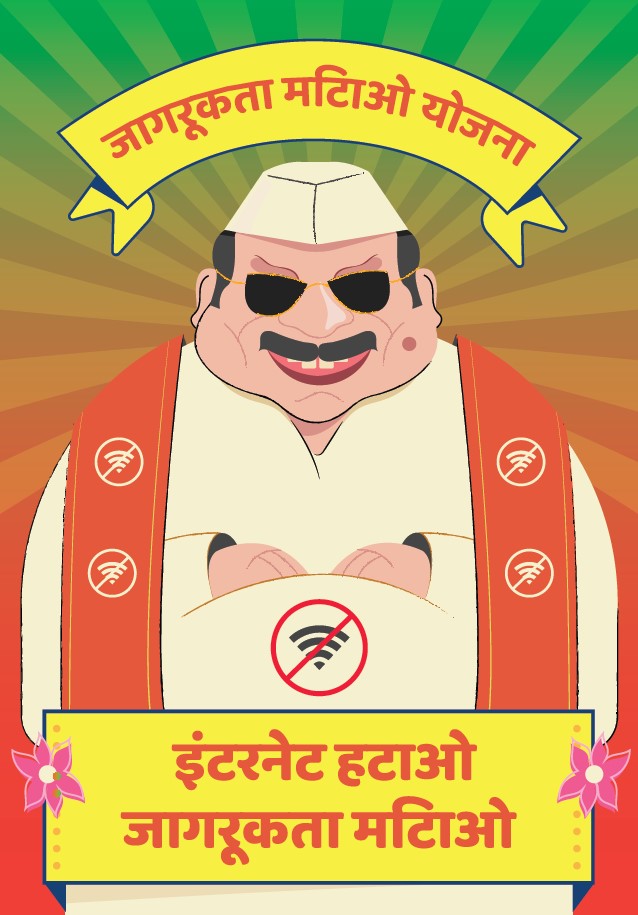
This cartoon is based on an old Indian school poster called the ‘bad habits chart’ that was used to illustrate good and bad habits for children. This poster shows the bad habits not of children but of politicians and citizens
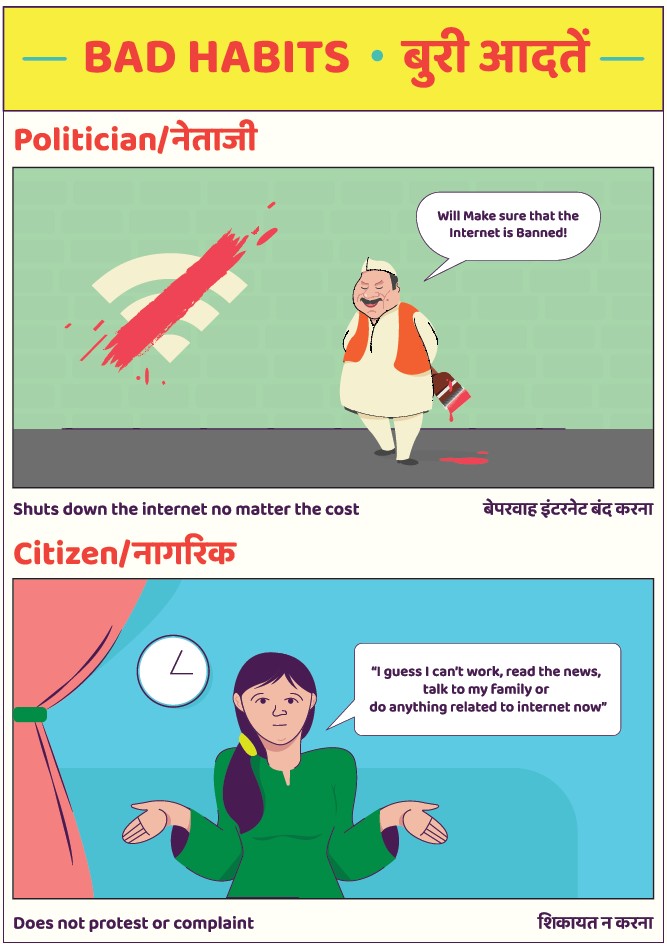
The last two images are comics featuring the Netaji and one of his constituents. In the first, the constituent is telling the Netaji he is worried about the impact of artificial intelligence, but the Netaji replies that it won’t impact him because he’s shut the internet where he lives. The second comic is meant to highlight the ironies inherent in shutting off the internet to prevent cheating on exams (a common justification), as the constituent can no longer access educational materials online and contribute to the digital economy.
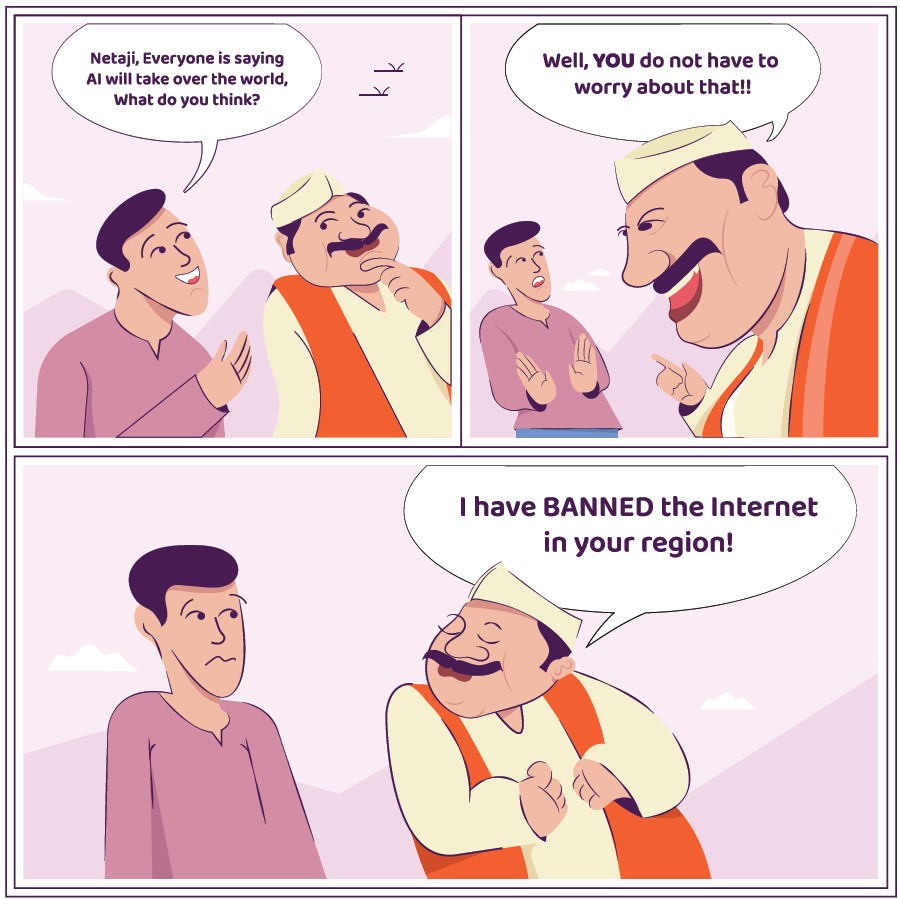
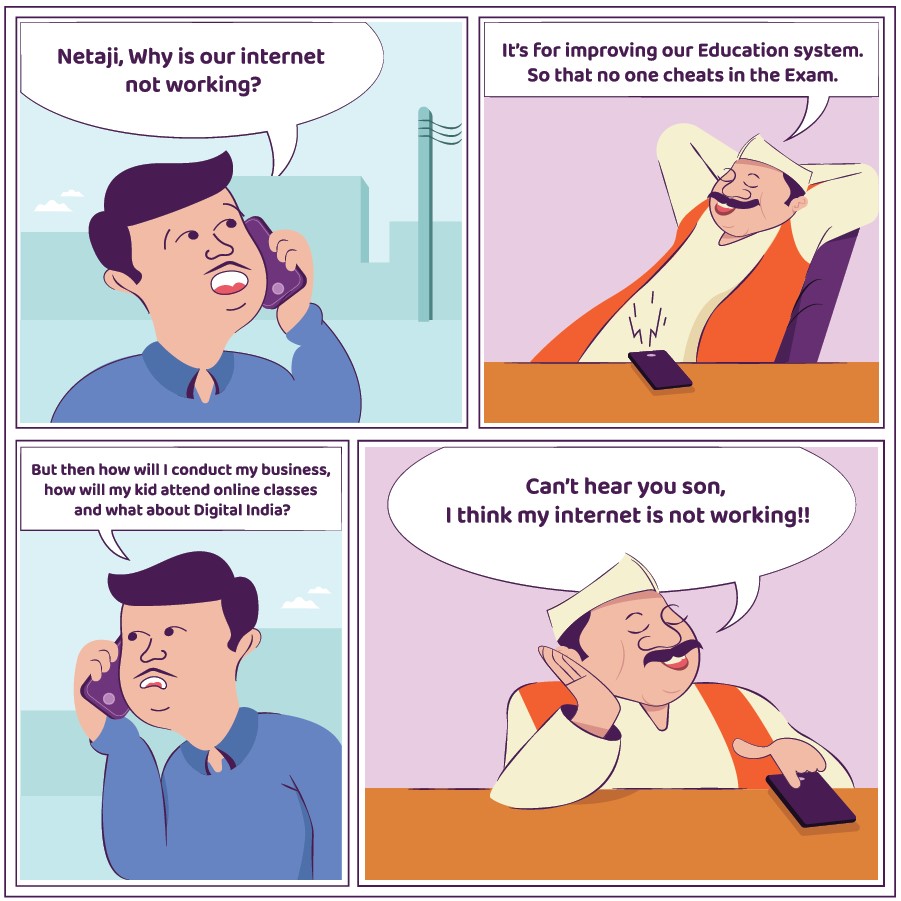
Girik TJ, Visual artist based out of India.
@girikgirikgirik on instagram
I have tried writing my artist Bio multiple times, failing always. This is another attempt and this time I will be as honest as possible. I don’t like my art to fall in a genre, a movement, a timeline or a singular philosophy or anything for that matter, and with all honesty I cannot describe it in words, rather I wouldn’t. As I have answered in the past when asked to explain my art and I say the same to you,” explaining my paintings in words is an insult to them.” Instead let me talk a bit about myself, I grew up in a small town in India and as long as I have memory, I have just been doing this, Painting. And it has always been free flowing, sure I went to an art school, of course I went to art school, this is the only thing i know how to do. And I tried other forms of art also, I tried being a lyricist ,a musician and a sculptor(still keen on trying this). It just does not work. Somehow I am just meant for this one thing, and I don’t know how else to put it. It is a calling, it is a gift, no matter how cliche it sounds, thats how my brain works, I remember things in visuals, I solve simple mathematics in my brain in visuals. I Imagine in paintings, when I observe things automatically I start drawing them in my head. And I love every part of it. I am just a simple painter who wants to paint, and I don’t care if I don’t become rich, if i don’t become successful or I have an audience, I would still paint, and paint till I have painted everything thats inside me and I will die trying this. This is one and the only thing that I understand and that I do.
Senegal Shutdown After Action Report
This after-action report, conducted in partnership with civil society partners in Dakar, was designed to be deployed quickly to understand
#InternetIsLife: Online Advocacy to Preserve Digital Civil Spaces in Tanzania
Internet Shutdowns in Tanzania For five years under President John Magufuli’s authoritarian government, Tanzania experienced the repression of civil liberties
Defending Democracy: Preparing Senegalese Civil Society for Shutdowns
Internet Shutdowns in Senegal Senegal’s reputation as one of the most stable democracies in Africa has faced a stress test